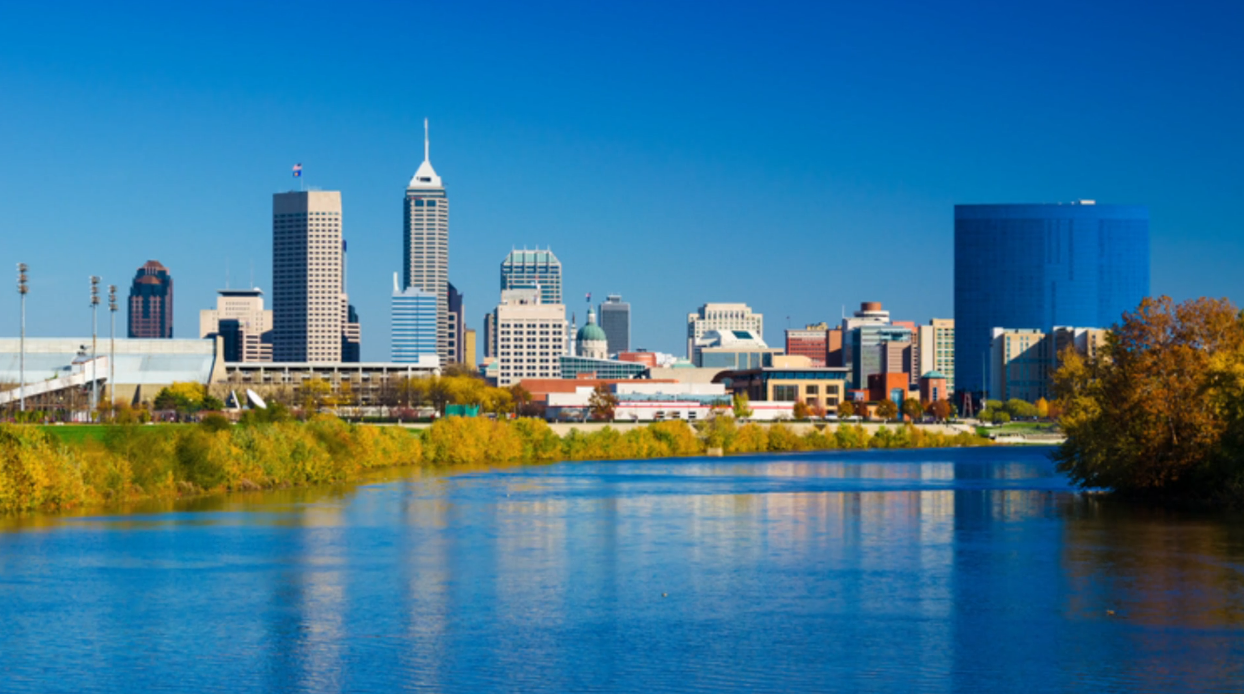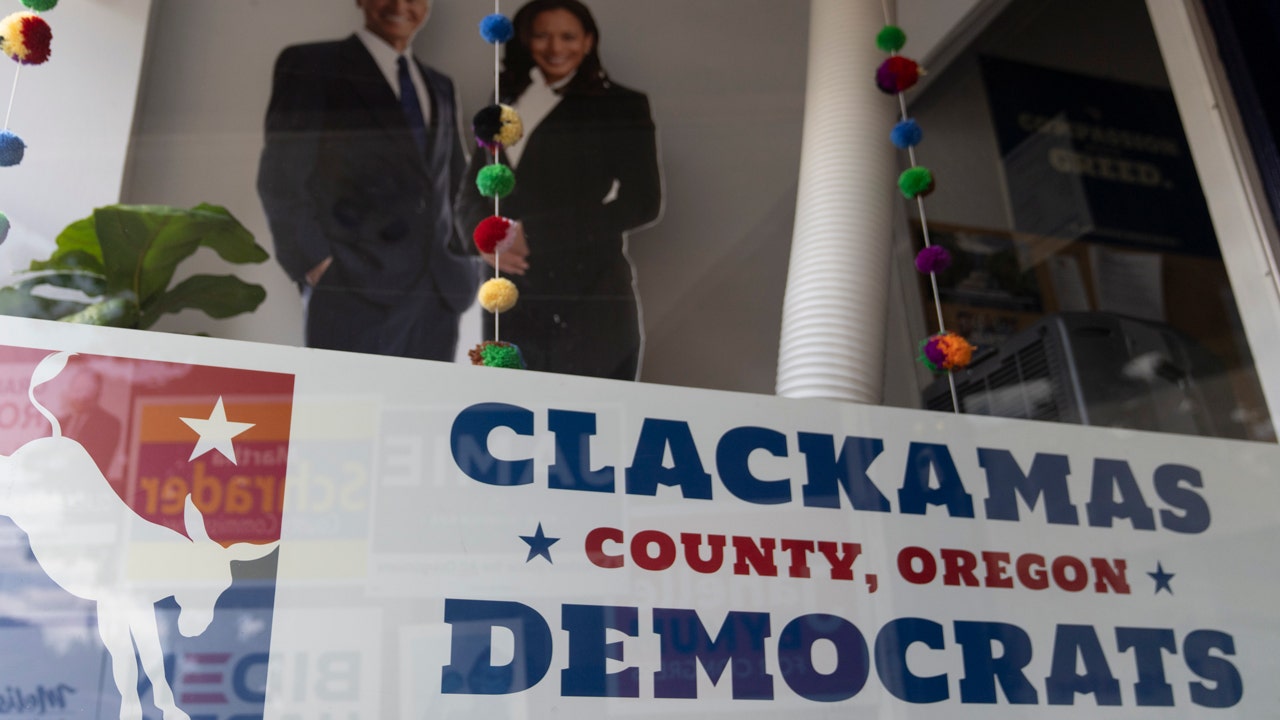Business
L.A.'s Oaxacan community rallies after wildfire devastates a region of Mexico famed for its mezcal
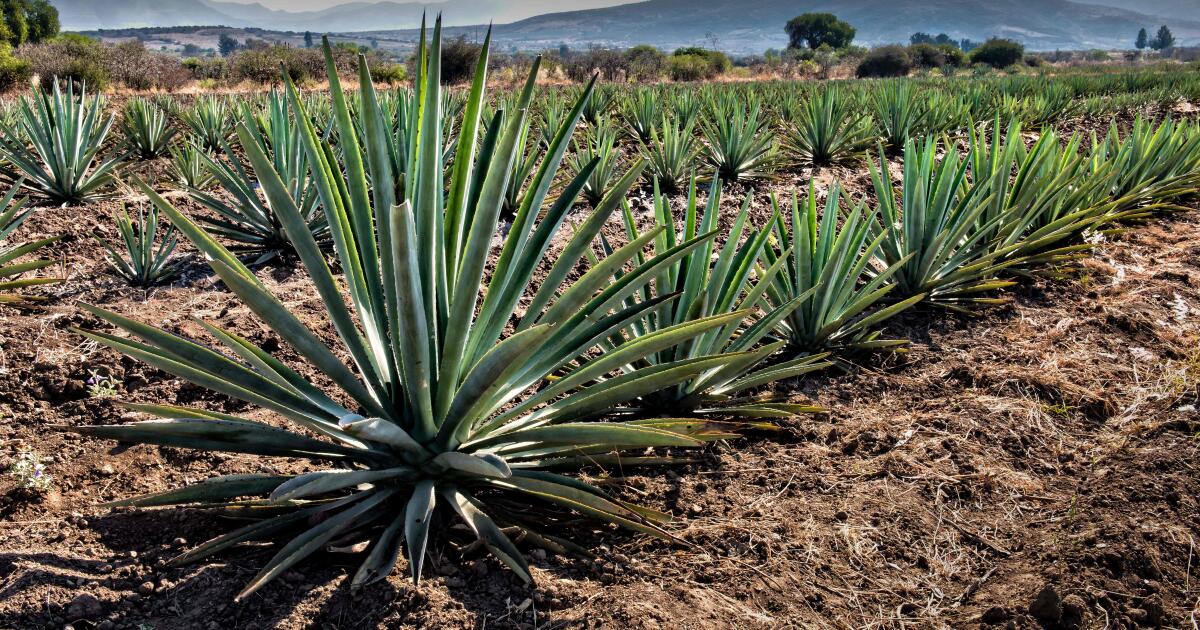
The photos and videos began flooding in Feb. 27. In a region of Oaxaca famous for its flavorful mezcal, a wildfire was raging dangerously close to the town of San Lucas Quiaviní.
Massive plumes of smoke choked the horizon as the flames drove toward the town of 1,700. At nightfall, local officials put out an urgent call for volunteers to head out the next morning to beat back the fire. They asked for people over 18 who knew the roads and urged them to don helmets and face masks.
It would be days before the state government intervened with enough equipment and resources to get the blaze under control. In the interim, residents of San Lucas Quiaviní and neighboring towns in this agave-growing hub tried to mount a defense with shovels, pick axes and what little water they could spare.
By the time the government declared the wildfire contained on March 5, it had scorched more than 1,700 acres. And five men from San Lucas Quiaviní had died after heeding the call to battle.
Some of the fire victims had worked in Los Angeles and have close family here. Their deaths have struck an emotional chord in the city, home to the largest Indigenous Oaxacan population outside Mexico. Oaxacan restaurant owners and youth organizers have rallied in support, raising money and donations to help the families and towns that suffered losses.
The men killed have been identified by local officials and organizers as Rafael Antonio Morales, 65; Pedro Curiel Diego, 64; Felipe Garcia, 41; Celso Diego, 65; and Jose Hernandez Lopez, 47. All were farmers.
The relatives and restaurateurs organizing support in Los Angeles say the Mexican government failed the towns, waiting too long to mount an aerial defense. More broadly, they believe that the boom in mezcal production in this region of Oaxaca has left Indigenous communities more vulnerable to natural disaster.
Mezcal, long a traditional and medicinal drink for Oaxacans, has swelled in popularity in the U.S. and beyond as a younger generation turns to craft spirits. As demand for the smoky liquor has climbed, vast tracts of forest in Oaxaca have been torn up and planted with agave, eroding the soil and weakening natural defenses in a mountainous region prone to wildfire and mudslides.
The fast-growing popularity of mezcal spirits has raised environmental concerns in Oaxaca as more land, water and firewood are dedicated to growing and distilling agave.
(Pedro Pardo / Getty Images)
At least 50 wildfires have broken out in Oaxaca in just the first few months of 2024 — though the state’s wildfire season typically starts in mid-March, according to El Universal, a Mexican publication.
“We’re in a critical period of drought and heat,” Oaxaca Gov. Salomon Jara Cruz said at a March 5 news conference. “The consequences are that we are more prone to any wildfire, whether it be brief, slight.”
Jara Cruz acknowledged the state was delayed in getting air support to San Lucas Quiaviní, but he said it readily deployed 267 personnel and 50 vehicles on the ground. He showed videos of the massive fire taken from the air, as well as images of San Lucas Quiaviní women carrying plastic jugs of water on their heads as they trekked up steep hills to deliver water to the men fighting the fire. The men who died had reportedly gone missing on Feb. 28, the day after they volunteered for duty.
“At all times, we have acted with responsibility and timeliness to protect the lives and integrity of Oaxacans,” Jara Cruz said.
In Los Angeles, days after the bodies were discovered, Indigenous youth held a rally in front of the Mexican consulate office in MacArthur Park to protest what they said was the government’s lax efforts to protect the people of San Lucas Quiaviní.
“I’ve heard from my cousin that they don’t even have proper shoes. They only have huaraches,” said Brenda Diego, who is Zapotec and lost an uncle in the fire. “They’re using machetes; they’re using shovels. They didn’t have anything prepared for a fire.”
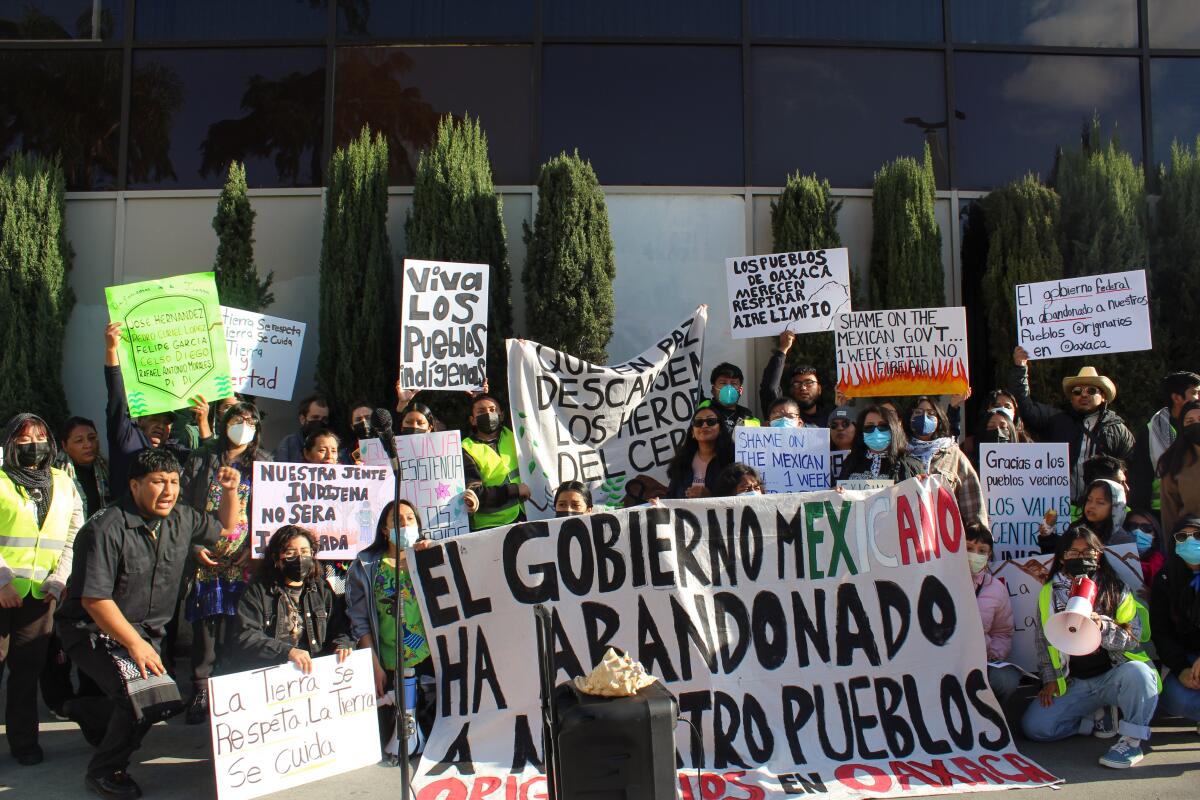
Indigenous youth in Los Angeles staged a protest to condemn what they said was a lack of government urgency in sending equipment and personnel to protect Oaxacan towns from wildfire.
(Courtesy of Daphne Santos)
Mireya Curiel, one of the Zapotec youth organizers, said she was related to three of the men who died. Rafael Antonio Morales, her grandfather’s cousin, was known to offer a friendly smile and helping hand around town. Two others, Pedro Curiel Diego and Celso Diego, were her uncles.
“Not only were these folks older, but these folks were also experts in the land,” said organizer Randy Santiago, a Zapotec of Santiago Matatlán. “Their loss to their community has been immeasurable. Their expertise, their knowledge of the land, their knowledge of tradition, culture, everything, has now been lost. That is the fault of the government.”
In recent days, the youth group has collected supplies requested by people in Oaxaca: masks and respirators, fire-resistant boots and clothing, battery-powered headlamps, compression gloves and socks. They were able to ferry the supplies to Tijuana, where someone picked them up and delivered them to Oaxaca in southern Mexico. They have raised more than $40,000 to purchase more supplies and support families affected by the fire.
Jose Curiel of Venice lost an uncle, Pedro Curiel Diego. He has launched a GoFundMe campaign to raise money for his cousin, Diego’s daughter. His uncle spent about 10 years working as a dishwasher in Los Angeles before returning to the hometown he dearly missed, Curiel said.
San Lucas Quiaviní, Curiel said, is a rustic town where few people have cars and some households still collect water with barrels. It doesn’t have the draw of bigger towns in the region — such as Santiago Matatlán, known as the “world capital of mezcal” — that offer tourist packages combining mezcal-tasting with tours of the agave fields. But it is peaceful, and many in L.A.’s Oaxacan community plan to return there to build their dream homes. He said the men who died did so in defense of that sense of community.
“They went out to help, to make sure not only that they were safe, but to save their families, their town, their whole community,” Curiel said.
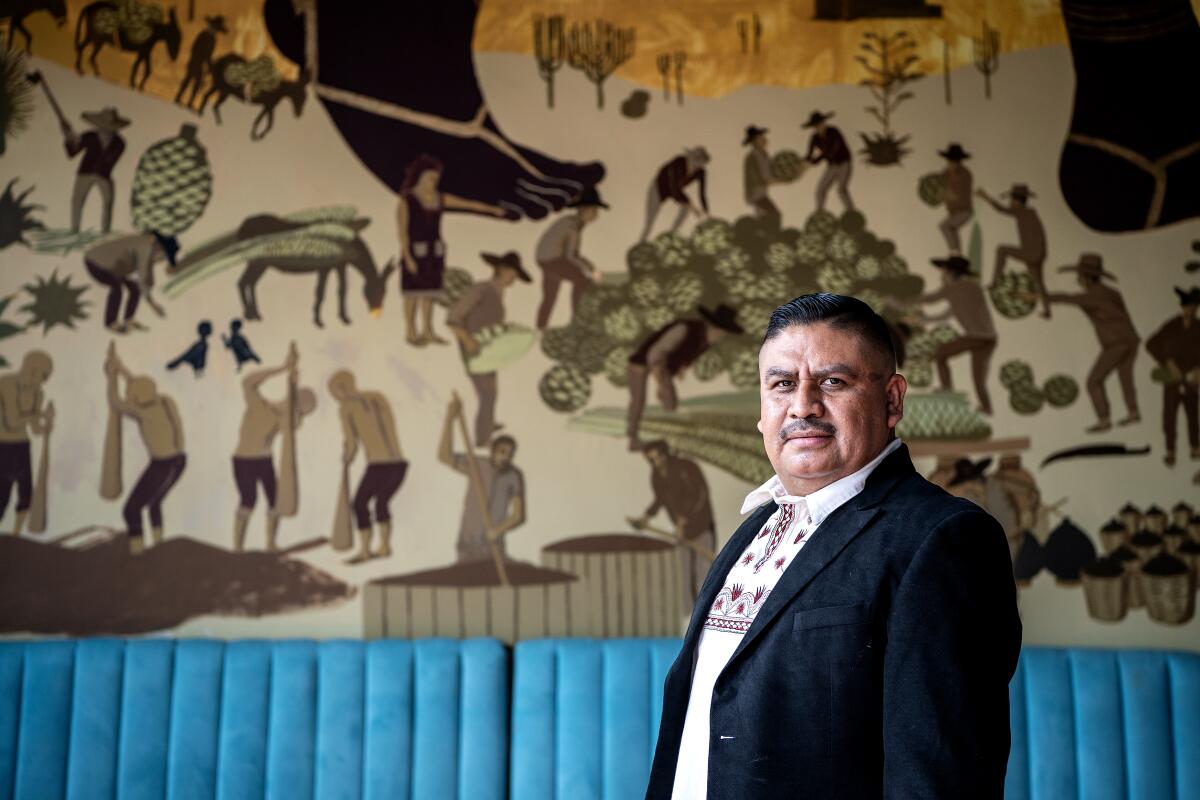
Ivan Vasquez, owner of Madre Oaxacan Restaurant & Mezcaleria, worries that the mezcal market is reshaping Oaxaca in ways that threaten Indigenous communities.
(Mariah Tauger / Los Angeles Times)
Ivan Vasquez, the owner of Madre Oaxacan Restaurant & Mezcaleria, which has four locations in Los Angeles County, spent a recent Sunday evening auctioning off vintage bottles of mezcal to raise funds for the towns affected, an event that generated more than $8,000. Vasquez, a native of Oaxaca City, travels to the region frequently to buy spirits from small-batch mezcaleros.
Vasquez said he was frustrated by the lack of awareness among large mezcal production companies moving into Oaxaca that benefit from the sprawling agave fields but have yet to support the communities affected by fire.
“Every single time that I go to Oaxaca and I go out of the city and go to the pueblos, you see more fields of agave replacing the trees,” he said. “The more agave you see, the more flattened land, the more fires we’re going to get. And the less water we’re going to get.”
Vasquez, who is Zapotec, said he worries about the future of the Indigenous communities as the mezcal market continues to reshape rural Oaxaca and global warming exacerbates conditions.
“This is just the beginning,” he said.

Business
Opinion: AI and privacy rules meant for Big Tech could hurt small businesses most

As lawmakers and regulators in the U.S. consider policy born of their Big Tech concerns such as data privacy and artificial intelligence, they should carefully consider how such changes could end up trampling the small and midsize businesses that drive innovation and competition.
While policymakers may have Google and Facebook in mind, the actual policies could unintentionally create new regulatory burdens that could deter investment in smaller businesses and prevent new companies from emerging. For example, calls to end Section 230 — part of a 1996 law that protects internet companies from some lawsuits — portray it as a handout to Big Tech, when in practice it would mean new social media companies would face liability early on, making it more difficult to compete and discouraging them from carrying user-generated content that provides new opportunities or ways of connecting.
In this way, regulations that policymakers may think target Big Tech could ultimately serve the biggest companies by placing increasing burdens on potential competitors.
In the U.S., the government has generally taken a hands-off approach to the technology industry, keeping barriers to entry low and fostering entrepreneurship. Today’s leading companies were once small startups, and regulators’ light touch allowed them to flourish, creating benefits for consumers that could not have been predicted. The economy and consumers need this approach to continue so today’s startups have a chance as well.
We can see this theory play out in the real world. Europe has taken a significantly different approach to technology policy, which has stifled small businesses. For example, after a European privacy law, the General Data Protection Regulation, went into effect in 2018, investment in small and startup businesses decreased, largely out of concerns that small companies would struggle to comply with the new rules.
In the short run, such investment decreased by 36%, and large players gained market share in the advertising sector. One effect of the regulation, according to a National Bureau of Economic Research study, is a “lost generation” of innovation; smartphone app stores have added nearly one-third fewer applications.
To protect consumers from exploitation by Big Tech, some policymakers in the U.S. have been flirting with a more European approach. However, many proposed policy changes would increase compliance costs or liability burdens on newer and smaller players that might not be able to afford them. This includes state-level data privacy policy that risks creating a burdensome and costly patchwork as well as calls by senators to impose AI licensing.
Beyond issues that have compliance costs such as data privacy and AI, some critics of Big Tech have called for antitrust enforcement to protect small businesses from the “kill zone” — the window of time in which a growing startup is bought by a big company before it can become a rival to that company. These critics also call for changes that would potentially limit mergers or acquisitions.
But this approach creates a false dichotomy between “big” and “small” business that misunderstands the way the startup ecosystem works. This strategy could hurt small businesses in many ways. Some may want to grow into challengers, but others were created with the hope of being sold; investors in startups are often looking for the right moment for the company to be acquired so they can recoup their money. That’s valid too; this cycle leads to more investment and more innovation.
Blocking mergers and acquisitions could force small businesses to stay small, or, worse yet, it could push them out of business. Antitrust rules that are preoccupied with curbing Big Tech would end up hurting the industry, the economy and consumers.
We saw this play out recently when regulators blocked Amazon’s acquisition of IRobot. The result is most likely not renewed competition but that consumers will have fewer options as IRobot faces a dire financial situation and lays off workers. If further burdens to mergers and acquisitions and a shift away from the focus on consumers continue, this could become a more frequent phenomenon, to the detriment of both small businesses and consumers.
Small businesses and startups play an important role in the tech ecosystem and have flourished under the light touch of U.S. regulators. After decades of experience, allowing policy to be shaped by today’s enmity toward Big Tech would be a dangerous swerve and could have unintended consequences for startups and consumers.
Jennifer Huddleston is a senior fellow in technology policy at the Cato Institute and an adjunct professor at George Mason University’s Antonin Scalia Law School.
Business
Ex-Dodgers owner Frank McCourt is forming an investment group to bid for TikTok
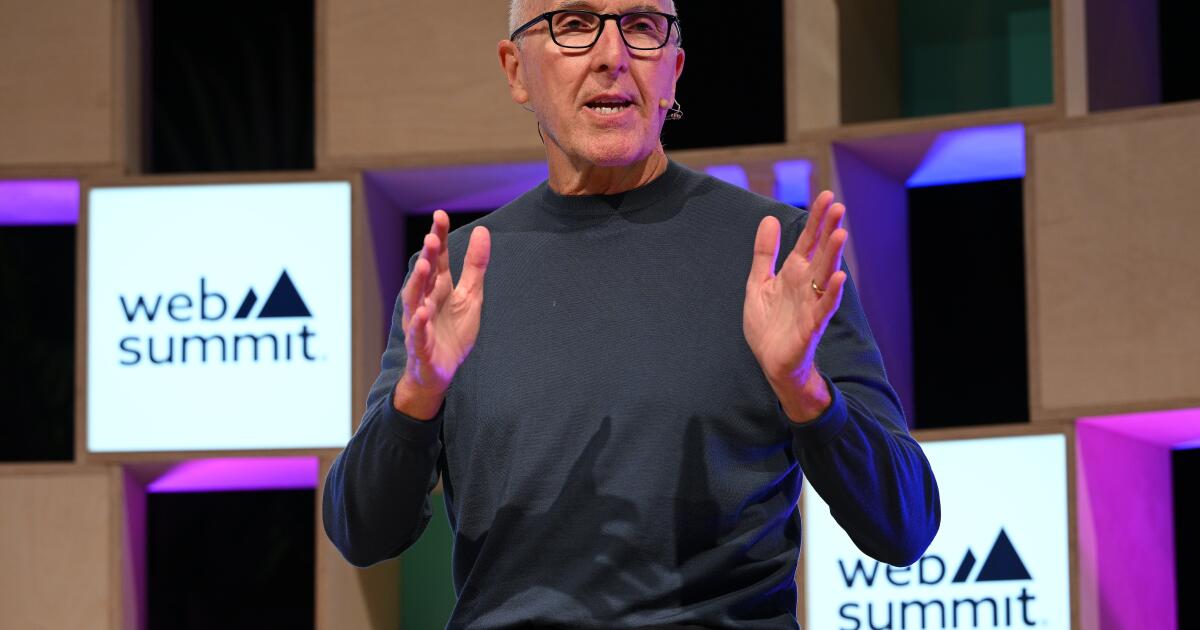
The anguished wails have gone forth from millions of tormented teenagers across the land of the free and the home of the brave. Who, these teenagers cry, can save us?
I can, Frank McCourt said.
In Los Angeles, the name rings a bell. McCourt is the former Dodgers owner who took the team into bankruptcy in 2011 and then sold it for a billion-dollar profit.
He is the force behind the proposed gondola from Union Station to Dodger Stadium, where he retains half-ownership of the parking lots surrounding the ballpark.
He owns the storied French soccer club Olympique de Marseille, and the Los Angeles Marathon. He donated $200 million to what is now called the McCourt School of Public Policy at Georgetown University. He launched Project Liberty, an initiative to reform the internet in the interest of serving “people, not platforms.”
Now, he says, he would like to buy TikTok.
The outrageously popular video app, part of the daily life of American teens and many adults as well, is owned by a Chinese company called ByteDance. The company is suing to block legislation that would force ByteDance to either sell or shut down its U.S. operations.
McCourt announced Tuesday that he plans to form an investment group to bid on TikTok, in a statement that said “McCourt and his partners are seizing this opportunity to return control and value back into the hands of individuals and provide Americans with a meaningful voice, choice, and stake in the future of the web.”
It is unclear when TikTok might be sold, if ever, and how many bidders there might be.
“TikTok presents the best and worst of the internet,” McCourt told the website Semafor. “It connects 170 million people and allows them to be creative and build things and enjoy things and do things.
“On the other hand, they don’t get to really share in the value that’s created, and their data is scraped and stolen and shipped to China.”
TikTok could fetch $100 billion, according to Semafor. McCourt said he has hired Guggenheim Securities to advise him on the bid, including sources of financing.
Guggenheim Securities bills itself as “the investment banking and capital markets business of Guggenheim Partners.” The chief executive officer of Guggenheim Partners: Mark Walter, the chairman of Guggenheim Baseball, the owner of the Dodgers and co-owner — with McCourt — of the Dodger Stadium parking lots.
Business
TikTok creators sue U.S. government in a bid to stop potential ban

Eight TikTok creators sued the U.S. government on Tuesday, alleging their rights to free speech are being violated by a new federal law that would ban the social video app if its Chinese owner doesn’t sell it.
U.S. politicians have raised security concerns about the app, saying that TikTok’s ties to its Chinese parent company, ByteDance, could allow a foreign country to collect American users’ data and influence public opinion.
A law signed by President Biden last month would require ByteDance to sell TikTok’s U.S. operations by Jan. 19 in order for TikTok to continue to be made available in the U.S.
The TikTok video creators, in their lawsuit filed in the U.S. Court of Appeals for the District of Columbia Circuit, said they use the app to upload content that helps them connect with different communities, exchange ideas and boost their businesses.
“The Act’s ban of TikTok threatens to deprive them, and the rest of the country, of this distinctive means of expression and communication,” the creators said in their petition. The complaint was first reported by the Washington Post.
The creators are asking for the court to declare the new law invalid and to stop it from being enforced.
The U.S. Department of Justice said it looks forward to defending the law, which has received bipartisan support.
“This legislation addresses critical national security concerns in a manner that is consistent with the First Amendment and other constitutional limitations,” the department said in a statement.
Opponents of the ban, or forced divestiture, say TikTok’s critics have offered scant evidence that the Chinese government is using the app to spy on U.S. citizens.
The creators’ lawsuit comes a week after TikTok and ByteDance sued the U.S. government on similar 1st Amendment grounds.
The companies said the law would require them to sever ByteDance’s control over TikTok’s popular algorithm, which would significantly alter the way the app functions. The algorithm allows TikTok to offer customized recommendations based on users’ viewing behavior, reaching an audience of more than 1 billion users globally.
TikTok and ByteDance said the new law “offers no support for the idea” that TikTok’s Chinese ownership poses national security risks.
The TikTok creators involved in Tuesday’s lawsuit are Texas rancher Brian Firebaugh; Memphis, Tenn., baker Chloe Joy Sexton; Maryland-based book reviewer Talia Cadet; North Dakota college football coach Timothy Martin; recent college graduate Kiera Spann in North Carolina; Paul Tran, co-founder of Atlanta-based skincare business Love & Pebble; Mississippi-based hip-hop artist Christopher Townsend; and Arizona-based Steven King, whose content centers on LGBTQ+ pride.
TikTok is providing funding for the lawsuit.
“We are supporting our creators who did not otherwise have the means to bring a lawsuit to protect their First Amendment rights,” TikTok said in a statement.
Some of the creators said they depend on TikTok for their livelihoods.
For example, Firebaugh sells ranch products on TikTok and receives money through TikTok’s creator rewards program. If the app were to be banned, he’d have to get a different job and pay for day care, the lawsuit said.
“In his words, ‘if you ban TikTok, you ban my way of life,’” the lawsuit said.
If ByteDance decides to sell TikTok’s U.S. operations, there are already interested buyers.
On Wednesday, former Dodgers owner Frank McCourt said he is organizing a bid under his Project Liberty initiative to buy TikTok. Former Treasury Secretary Steven T. Mnuchin, who heads Liberty Strategic Capital, in March said he is assembling an investor group to bid.
Tech companies such as Microsoft and Oracle could be bidders as well, analysts have said.
Times news researcher Scott Wilson contributed to this report.
-

 News1 week ago
News1 week agoSkeletal remains found almost 40 years ago identified as woman who disappeared in 1968
-

 World1 week ago
World1 week agoIndia Lok Sabha election 2024 Phase 4: Who votes and what’s at stake?
-

 Movie Reviews1 week ago
Movie Reviews1 week ago“Kingdom of the Planet of the Apes”: Disney's New Kingdom is Far From Magical (Movie Review)
-

 World1 week ago
World1 week agoUkraine’s military chief admits ‘difficult situation’ in Kharkiv region
-

 Politics1 week ago
Politics1 week agoTales from the trail: The blue states Trump eyes to turn red in November
-

 World1 week ago
World1 week agoBorrell: Spain, Ireland and others could recognise Palestine on 21 May
-

 World1 week ago
World1 week agoCatalans vote in crucial regional election for the separatist movement
-

 Politics1 week ago
Politics1 week agoNorth Dakota gov, former presidential candidate Doug Burgum front and center at Trump New Jersey rally

